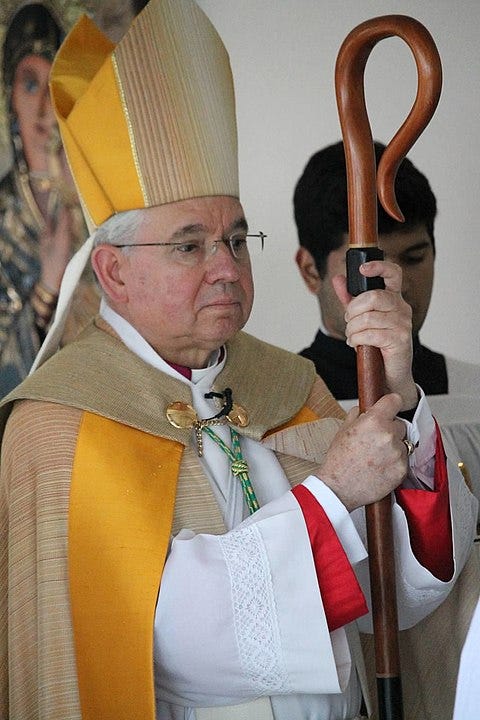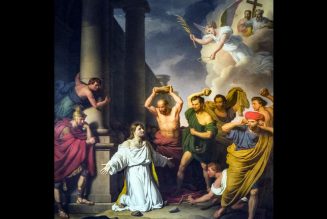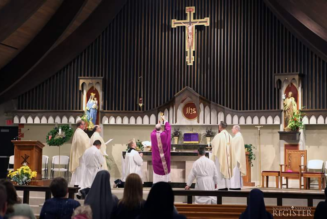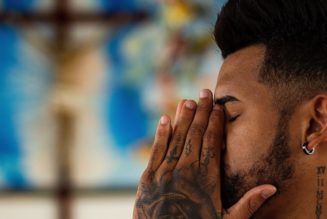Happy Friday friends,
Yesterday was the memorial of St. Charles Borromeo, a saint near and dear to my heart — not least because the church where I was married is dedicated to him.
He’s best remembered for his career as Archbishop of Milan, where his reforming zeal was matched by his pastoral concern — during the plague he personally administered Communion to the sick, and was cited as an example by a lot of concerned pastors I know during the worst of the pandemic last year.
Not quite as many people remember his time as the cardinal-nephew to Pope Pius IV, during which he was put into the middle of both the ecclesiastical and temporal governance of the Church and Papal States (and also the Knights of Malta, as it happens).
He led by example, living a life of personal austerity in the midst of the kind of opulence you might expect of Rome under a Medici pope, and also ordered members of the Roman curia to wear black. So, pandemic or no pandemic, he remains a saint for out times.
Quick links
While we are on the subject of curial affairs, we reported this week on the latest developments in the Vatican financial trial.
Of equal interest is the news that recordings of a few interviews with a few witnesses were redacted, because some small sections concerned separate investigations. That fact raises the prospect that we may see more charges against more people in the future. That’s not nothing.
—
Elsewhere in the news, the Archbishop of Melbourne, Australia, is pushing back against a state bid to change equality laws.
The government wants to remove the ability of a range of Church institutions to make decisions on hiring and firing if it touches “personal characteristics” like sexual orientation, lawful sexual activity, and gender identity.
Archbishop Peter Comensoli has warned the reforms will leave it “up to a court or a government bureaucrat to determine what constitutes faithful conduct in a religious context.”
—
Closer to home, we reported this week on an interesting lawsuit related to the right of religious adoption and foster care agencies to decline to place children with same-sex couples. It’s not what you think.
You might have thought this issue was settled earlier this year with the Supreme Court ruling in Fulton v City of Philadelphia, but that ruling was really rather narrow. Now, a woman in Tennessee is suing the federal government over its use of religious groups to resettle unaccompanied migrant minors with foster families.
Bethany told her that even though they no longer had a national policy on the issue, they are bound to observe Catholic teaching on the issue because their federal funding comes in a subgrant from the U.S. bishops’ conference.
—
Cardinal Blase Cupich on Monday published an essay outlining his sense of the principles behind Traditionis custodes, Pope Francis’ limitations on celebrations of the Extraordinary Form of the Mass.
This week, JD took a look at the task the cardinal, and by extension other bishops, may face in reconciling the “constant tension between ideas and realities” identified by Pope Francis in Evangelii gaudium.
You can read the whole thing here.
Hard lessons
The first is human. Maybe you, or I, have read about the Pennsylvania grand jury report, or even read the whole thing. Maybe we’ve read similar reports from Iowa, or Colorado, or I don’t know where else, and you just don’t want to hear these stories anymore, or think about the horror of it all, all over again. You just want to, you know, move on past it.
But, at least for me, I have to put out of my mind the idea that this all happened “out there” somewhere, a while ago, sometimes a long while ago, and remember that the people in these reports aren’t “out there” somewhere — they’re (hopefully) in a pew, in a parish, somewhere, living with this everyday, and the people sitting next to them aren’t reading about “somebody” “somewhere”, they’re reading about the people in their parishes, and their priests, and their bishops. They are reading about their home.
These people have a right to be heard, and as our brothers and sisters in the Church, we owe them a hearing. I owe them that hearing.
The second reason is institutional.
Yes, there is a sense we have read all this before; indeed as the Nebraska AG noted, the similarities between his findings and those in other states are striking. But we need that data, not to put it too crudely, if we are going to really look at the horror shows that went on under the noses of dioceses in this country for decades and say never again.
We need to know, and to record, that, for example, the vast majority of the victims were young and male, teenagers, by and large, not small children. And we need to think about what that tells us about the psychology of predators, and what to look out for in seminary formation.
We need to recognize the consistent patterns of grooming behavior by abusers, which emerge across dioceses, across states, and across decades, and learn from that — developing policies and particular law to address and arrest this kind of behavior before the worst happens.
And we need to understand all this not just as a retrospective exercise but looking ahead, so we can get things right before they go wrong in the future: The AG noted in his press conference yesterday that, while grooming behavior was and is consistent among abusers across the decades, the way it happens is changing and increasingly shifting to online means.
We also need to look at the hard cases the AG report highlights and ask the hard questions about bishops like Fabian Bruskewitz, who as bishop of Lincoln publicly pulled his diocese out of the external audits recommended by the Dallas Charter, and under whose watch the AG report found some very problematic cases. Hard questions the process created like Vos estis lux mundi appears designed to ask and answer.
We need to learn these lessons as a Church now, or we are going to have to learn them in the future, at the cost of the suffering of who knows how many more victims.
Going for woke
Yesterday, Archbishop Jose Gomez of Los Angeles delivered a speech to the Congress of Catholics and Public Life in Madrid. Speaking via video link, the USCCB president offered some strikingly direct reflections on the theme of the rise of new secular ideologies and movements for social change in the U.S. and their implications for the Church.
Gomez made some observations about the acceleration of social change as a result of the pandemic, social isolation, and the widespread demonstrations which followed the killing of George Floyd, whose name, Gomez said is now known around the world “because for many people in my country, myself included, his tragedy became a stark reminder that racial and economic inequality are still deeply embedded in our society.”
“We need to keep this reality of inequality in mind,” the archbishop said, because the new secular movements are part of a wider “absolutely essential” discussion about building a more just society.
According to Gomez, “the best way for the Church to understand the new social justice movements is to understand them as pseudo-religions, and even replacements and rivals to traditional Christian beliefs.”
“Whatever we call these movements — ‘social justice,’ ‘wokeness,’ ‘identity politics,’ ‘intersectionality,’ ‘successor ideology’ — they claim to offer what religion provides.”
The archbishop lays out his case for how secular progressivism is now offering a “rival ‘salvation’ narrative” to Christianity, one which is fundamentally Marxist but, ironically, borrows heavily from historical Christian heresies like liberation theology, Manichaeism, Pelagianism and Gnosticism.
He concludes that the “answer is simple.” “We need to proclaim Jesus Christ. Boldly, creatively.” And he makes a compelling case for how.
You can read the whole speech here. It’s interesting.
What I find particularly interesting about Gomez’s speech, apart from the text, is two things:
The first is that he chose to make such a direct and in-terms attack on what we’ve taken to calling wokeness — and its quasi (or not so quasi) religious status among whole sections of our society.
He’s courting the attention of some very angry people, people who already have a habit of tearing down statues and vandalizing churches in Gomez’s home state of California, and there’s no obvious benefit to him for doing so — only his apparent commitment to speaking as he thinks on a subject which is certainly front and center in our national life, yet hasn’t tempted too many of his brother bishops to weigh in.
Flipping through the immediate reactions to Gomez’ speech, the need for his intervention, and the veracity of his diagnosis, appear to be self evident: Quite a few people, and a few apparently self-identifying Catholics, called him things like a fascist, a white supremacist (odd, given he was born in Mexico and speaks English as a second language), and (interestingly) a heretic and schismatic.
At least those mounting the latter charges would seem to implicitly agree their politics are religion, even as they condemn Gomez for challenging it as such.
The second thing I found interesting about Gomez’s speech was the timing:
It comes less than a week after President Biden claimed an effective papal endorsement for himself and his presidency (regardless of whether you accept Biden as a reliable narrator) and less than two weeks from the USCCB’s fall assembly in Baltimore.
While the draft text of the bishops’ document on the Eucharist does not contain the kind of explicitly political language many commentators, if few bishops, were expecting, looming large over the meeting will be Pope Francis’ stated preference that bishops not wade into politics.
While some will interpret Gomez’s speech yesterday as a prophetic witness on the signs of the times, others — I suspect some bishops even — will charge the USCCB president with wading into the political fray right up to his pectoral cross.
Whatever the good or bad faith of those assessments, Gomez will surely have anticipated them and decided to go for broke anyway.
It’s quite the statement of intent heading into Baltimore.
Private lines
An odd news item caught my eye this week. Apparently a few senators, including Shelly Moore Capito of West Virginia and Susan Collins of Maine, received calls on their private lines recently from a concerned citizen looking to lobby them on paid family leave.
“This is Meghan, the Duchess of Sussex,” the caller explained.
Now, I know what you’re thinking: what a curious way to introduce oneself as you inject yourself into the democratic process. Perhaps she thought “retired minor TV actress in a supporting role and occasional podcast cohost” was too much of a mouthful for a first impression.
The senators were apparently surprised to receive the calls, as I’d imagine they would be – foreign royalty weighing in on American lawmaking is historically ticklish.
Fortunately, a spokesperson for the duchess clarified to the Washington Post that she was “acting in a private capacity” when she rang – as opposed to the various public offices she holds, I guess?
Anyway, the chats were apparently friendly, and, like the duchess, I too think paid family leave is a “national right”, or at least should be.
But I, too, am an occasional podcast cohost, married to someone from England, yet no one has given me senators’ private numbers — and I have asked, in one or two cases. Perhaps I should blame my wife for failing to sufficiently “empower” me with a duchy of my own, then maybe I could be more effective in my private capacity.
Isn’t democracy wonderful?
See you next week,
Ed. Condon
Editor
The Pillar
Join Our Telegram Group : Salvation & Prosperity














